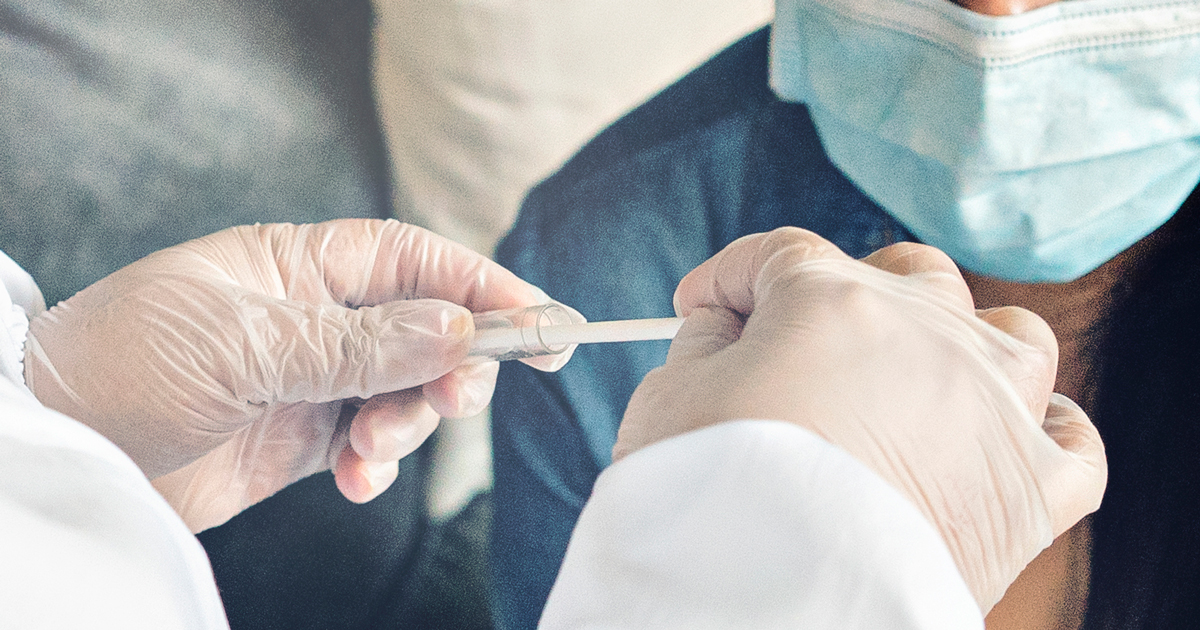How accurate are at-home rapid tests for COVID-19?

Rapid antigen tests, like the polymerase chain reaction (PCR) tests, check for active infection of COVID-19. PCR tests, which require a lab to detect the genetic material of the coronavirus, are the gold standard for COVID-19 testing. Find out the difference between PCR tests and rapid tests here.
But rapid antigen tests are still helpful. Scott Koepsell, MD, PhD, is the medical director of the University of Nebraska Medical Center main testing lab. He says, "Rapid tests are not as accurate as our laboratory PCR testing, but they can be useful in some situations. For example, in a patient with symptoms that are suspicious for COVID-19, a positive rapid antigen test is likely correct. In this case, a very quick answer in just minutes can help that infected person isolate and develop a plan to monitor their symptoms."
Rapid antigen tests, like PCR tests, aren't perfect. If you get a negative result, that doesn't mean you are free of COVID-19. It might mean you tested too early or too late.
"People without symptoms of COVID-19 should not use one rapid test alone to clear themselves of being infectious," says Dr. Koepsell.
"As vaccination rolls out, testing is still incredibly important," says Dr. Koepsell. "Not everyone is vaccinated, especially our children, so we need to continue diagnosing the virus.
Testing enables appropriate isolation and protects health care workers who perform high-risk procedures on patients."
Five at-home, over-the-counter COVID-19 tests have received FDA authorization. Three are rapid antigen tests (from Abbott, Ellume and Quidel), and the other two are molecular-based tests (from Cue Health and Lucira). Here's a rundown of how accurate each test is compared to PCR testing. None of these tests require samples to be sent to a lab – you can get results in your own home.
Abbott's BinaxNOW rapid test
How to use: The BinaxNOW antigen test is pretty easy to take – only a shallow nostril swab is necessary. There's a card you place your swab into. Like a pregnancy test, a single line means the test is negative. Two lines indicate a positive result.
Accuracy: The BinaxNOW test correctly gave a positive result 84.6% of the time compared to PCR. In the same study, the test correctly gave a negative result 98.5% of the time.
Availability: The BinaxNOW test costs $24 for two tests, which are meant to be used on the same person within three days (serial testing). The BinaxNOW test does not meet travel requirements for testing.
Cue Health's molecular-based test
How to use: For this molecular-based test, you'll insert a wand about 1 inch into the nostril, and rotate it five times. Then you place the wand into a cartridge, which goes into a cartridge reader for about 20 minutes. You need to download an app to see the results.
Accuracy: The Cue COVID-19 test correctly gave a positive result 92% of the time compared to PCR. In the same study, the test correctly gave a negative result 98% of the time.
Availability: This test is not yet available to the general public.
Ellume rapid test
How to use: This rapid antigen test uses a nasal swab that goes further back than nostril swabs but not as far back as the nasopharyngeal swab that a health care provider would use in a PCR COVID-19 test. Ellume's rapid COVID-19 test can send results to your smartphone in 15 minutes. The app then reports the results to public health experts.
Accuracy: In a U.S. clinical study, the Ellume test showed 96% accuracy for symptomatic individuals. For people without symptoms, the test correctly identified 91% of positive cases.
Availability: Each test costs about $35. You can find it in some pharmacies (like CVS) or online at Amazon.
Lucira Check It molecular test
How to use: This molecular COVID-19 test requires you to swab the inside of your nostrils, then swirl the swab into a small sample vial. The testing unit runs for 30 minutes, and then a light-up display shows if the test is positive or negative.
Accuracy: For people with symptoms, the Lucira test correctly gave a positive result 94.1% of the time. In the same study, the Lucira test correctly gave a negative result 98% of the time.
Availability: Costing about $55, you can order the Lucira test at lucirahealth.com.
Quidel QuickVue rapid test
How to use: Like Abbott's BinaxNOW test, the Quidel antigen test also works like a pregnancy test. First, you take a nasal swab, then mix the swab with a tube of liquid for one minute.
Next, you place the swab in the detector strip. Two lines mean a positive result.
Accuracy: For people with symptoms, the QuickVue test correctly gave a positive result 83.5% of the time. It also correctly gave a negative result 99.2% of the time.
Availability: This test is not yet available to the general public.




